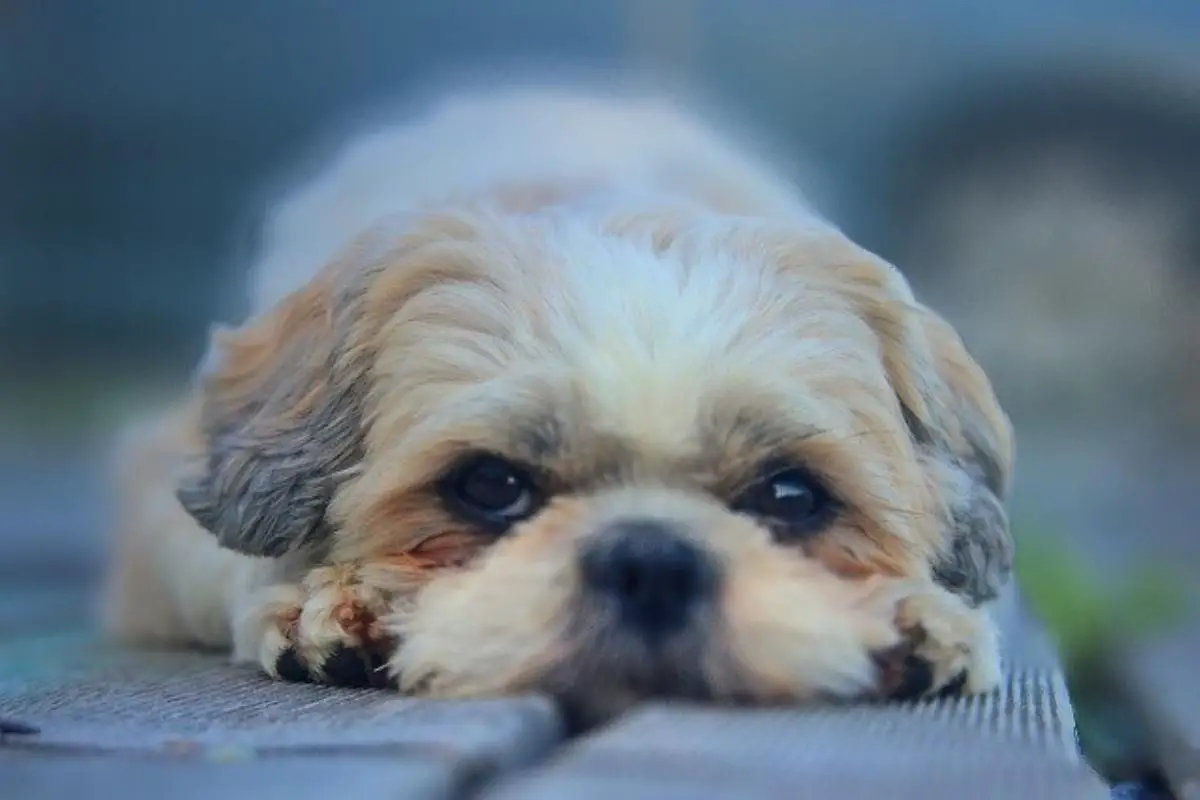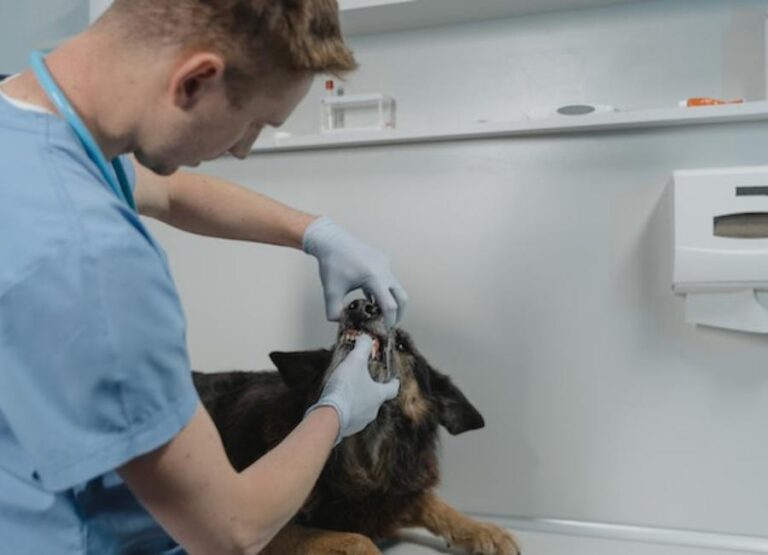13 Most Common Shih Tzu Stress Symptoms & 7 Fixing Hacks

If you want to know more about Shih Tzu stress symptoms then you are in the right place, just read through to find out the common Shih Tzu stress symptoms.
As a big fan of Shih Tzus, I will outline and discuss some of the most common Shih Tzu stress symptoms you should know.
I will also outline some common ways to keep your Shih Tzu happy to avoid unnecessary stress that may lead to some common Shih Tzu behavior problems.
Before we go any further, I’d like to make one point. Avoiding and all acts that contribute to stress is the best strategy to cope with Shih Tzu’s stress.
Most Common Shih Tzu stress symptoms
Dogs can be stressed or anxious, and the symptoms are similar in both situations, but there is a distinction.
When your dog becomes stressed, it’s usually a reaction to something particular that will subside after the cause of the stress is removed.
Anxiety, on the other hand, is a long-lasting emotion that does not fade away easily even when corrected.
If the stresses in your dog’s life aren’t handled, it might lead to a long-term severe condition.
Here are the common Shih Tzu stress symptoms you should know:
Constant licking of lips and paws
Although Shih Tzus lick just about everything, excessive lips and paws licking are most times considered as a common sign of stress in Shih Tzus.
If your Shih Tzu is licking their lips and front paws a lot, it might be a sign that they are stressed.
Your dog may also try to relax by licking its lips or yawning, and these habits are significant symptoms that your dog is stressed.
Your Shih Tzu may lick her lips and yawn when she is nervous. When they’re savoring a nice reward, it’s usually a slower lick.
Loss of appetite
Whenever your dog has a regular appetite but suddenly stops eating, it might be due to stress and you should not ignore it.
Although temporary intervals of not eating are common in Shih Tzus, a persistent loss of appetite, especially when accompanied by weight loss, is a strong sign of stress or a serious health problem that should be assessed by a veterinarian.
Loss of appetite can also indicate that your dog is sick, so keep an eye out for adverse reactions and, if required, see your veterinarian.
Sudden excessive sleeping
Something is wrong when your Shih Tzu, who generally sleeps for 5 to 6 hours at a time, sleeps for longer periods, such as 8 hours in a row.
Perhaps your dog is simply weary, but if he or she is sleeping a lot more than normal, stress could be the culprit.
Keep an eye on your dog’s behavior to make sure there isn’t anything wrong with him.
If your dog’s behavior has abruptly altered, it’s a sign that something is wrong.
Either they aren’t feeling well or they are experiencing stress or anxiety.
Consult your veterinarian if your dog is fully sluggish or exhibits other symptoms for an extended length of time.
Read more: Why Do Shih Tzus Sleep So Much: 10 Reasons To Note. And Shih sleeping disorders.
Cowering
Cowering refers to shrinking or stooping in response to anything that threatens, dominates, stresses, or displeases your Shih Tzu.
As a result, if your Shih Tzu is crouched, especially with a tucked tail and trembling, they’re most likely stressed out or scared.
Analyze the situation and your dog’s proximity to see whether anything out of the ordinary is making your dog stressed out.
Wanting to be alone suddenly
It’s either unwell or stressed out if your Shih Tzu starts running away from you and goes to hide somewhere to be alone.
Shih Tzus are active, sociable dogs. It’s possible that your pet is worried or anxious if it abruptly withdraws.
Although many small breeds of dogs enjoy being alone, too much of it might suggest a problem which could be too much stress.
Before determining what to do, keep a watch on your pet for any more symptoms, to find out what exactly is the cause.
Restless pacing upon your return
When your Shih Tzu starts pacing back and forth when you return home or are about to leave, it’s a sign that something is bothering them, and they can’t rest.
It may not be a big deal if your Shih Tzu paces back and forth at mealtimes or for short periods when you’re out on a walk.
If your Shih Tzu exhibits this behavior frequently, you might be able to find out what’s bothering them.
Do not ignore your Shih Tzu if the pacing is continuously increasing, find out what is wrong and fix it. Most of the time the primary causes are stress or separation anxiety.
Increased aggressiveness
Aggression is described as hostile, damaging, or destructive behavior directed towards another individual, human, or animal.
Aggression is one of the most common reasons Shih Tzu owners seek professional help for their Shih Tzus.
Your generally peaceful Shih Tzu is likely reacting to stress by becoming aggressive or snippy.
Aggressive behavior in Shih Tzus is a serious issue that you should address immediately with your veterinarian once you identify the cause of the aggression.
Read more: My Shih Tzu Seems Sad: 10 Sad Shih Tzu Causes & Solutions.
Sudden and constant growling
Your Shih Tzu utilizes growling as a means of communication because it can’t tell you whether it’s sad or uncomfortable using words.
Your Shih Tzu’s growling is a frequent way for him or her to convey how unsettled he or she is over time.
It might mean that someone is violating their personal space, that they are afraid, or that they are bothered by anything.
When your happy Shih Tzu suddenly starts unnecessary growling than what is expected, don’t pay deaf ears find out what is wrong.
Sudden destructive chewing
Even though Shih Tzus are little, they chew items as a sign of stress more than most large dogs.
Chewing is a natural activity in Shih Tzus of all ages, however, It depends though, on what they’re chewing and why they’re chewing.
Chewing for Shih Tzu can help reduce moderate tension and stress as well as battle boredom.
When your Shih Tzu starts chewing objects that aren’t meant to be chewed, keep an eye on their stress level.
Instead of shouting at your Shih Tzu for chewing on your items, try to find out why they are chewing and fix it, shouting can only make things worse.
Continues freezing
While your Shih Tzu freezes or gets rigid when you’re around, it means he’s concerned about something pr he is stressed out.
Freezing your Shih Tzu without reason can be quite harmful to both you and your dog. You need to fix it before it gets out of hand.
It’s a sign that your Shih Tzu is stressed out and won’t be able to handle the situation, and a bite might be the next step.
Excessive freezing in small breeds like Shih Tzu is a common indication of anxiety that should not be neglected in real life.
Read more: Why Do Shih Tzus Dig: 10 Reasons & Solutions
Constantly tucking of tail
When your Shih Tzu’s tail is dragged down, it indicates that she is apprehensive, stressed, hesitant, or fearful.
When the tail is kept just below the topline, your Shih Tzu may appear confused and stressed, which means you should pay attention to your Shih Tzu.
The level of fear and reinforcement indicated by the body language determines how far the tail is tucked.
Keep in mind that if your Shih Tzu’s tail is tucked beneath its tummy all the time, it suggests your Shih Tzu is afraid, stressed, or anxious.
Shivering or shaking on your departure
Many little dog breeds or pets shiver when stressed or scared when their owners tend to leave, and the Shih Tzu is no exception.
This trembling is often accompanied by a tucked tail, cowering, and other stress-related behaviors, all of which are signs of stress.
If your Shih Tzu is shivering even though it isn’t cold outdoors or indoors, it might be due to anxiousness or stress. Here are some reasons Shih Tzus shakes.
In the same way, if you’ve ruled out any medical issues, your Shih Tzu is most likely anxious or stressed.
If your Shih Tzu starts to shake or shiver when you are about to leave for work, it’s either separation anxiety or stress.
Read more: Why Do Shih Tzus Cry: 7 Reasons Shih Tzus Cry & Solutions.
Continues whining on your return or departure
If your Shih Tzu is nervous or anxious, he may whine at any time.
If the stressor is anything like loud noises that your dog can’t escape, whining is often followed by pacing.
Otherwise, your Shih Tzu may be crying and sitting about for no apparent reason.
If your Shih Tzu isn’t whining because he has to go outdoors or is in pain, it’s most likely stress.
When dogs are stressed, they frequently lose control of their whining, which is a natural response.
It is, however, a clue that something in your Shih Tzu’s surroundings is causing concern. Whining can also be a sign of stress.
How to resolve stress in Shih Tzus
Shih Tzu parents should examine their actions to determine if they are adding to the stress.
Shih Tzu parents might stress their Shih Tzus by failing to give precise directions, gazing directly at them, starving them, shouting at them, or punishing them excessively.
The easiest method to soothe your Shih Tzu is to figure out what’s bothering them and then remove the source of tension.
The easiest method to soothe your Shih Tzu is to figure out what’s bothering them and then remove the source of tension.
Collaborate with a professional trainer or your veterinarian to help them become less reactive to the trigger.
Here are some common ways to fight or avoid unnecessary stress in Shih Tzus:
- Establish a working daily routine and stick to it.
- Invest in more treats and interactive toys.
- Invest in some antianxiety products.
- Desensitize your Shih Tzus.
- Keep your Shih Tzu busy at all times of the day.
- Create stress-free environment.
- Create time to exercise and play with your Shih Tzu.
Read more: What Makes Shih Tzus Happy: 23 Shih Tzus happy Hacks.
I hope your question about Shih Tzu Stress Symptoms was addressed!!!


![10 Causes of Shih Tzu Itching and Licking [Useful Tips] Shih Tzu Itching And Licking](https://petcreeks.com/wp-content/uploads/2023/04/Shih-Tzu-Itching-And-Licking.jpg)

![Head Trauma in Dogs [Signs, Causes & Treatment] Head Trauma in Dogs](https://petcreeks.com/wp-content/uploads/2023/12/pexels-mikhail-nilov-7469230.jpg)
![Dog Traumatized After Spay [Helpful Tips] Dog Traumatized After Spay](https://petcreeks.com/wp-content/uploads/2023/02/Dog-Traumatized-After-Spay-768x555.jpg)
